MercoPress. South Atlantic News Agency
Tag: Andrés Cisneros
-
Sunday, September 17th 2023 - 08:09 UTC
“The Falklands problem is not the Islanders or the English, but us Argentines,” points out Cisneros
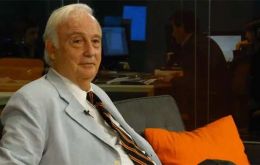
The Falklands/Malvinas will eventually be returned to Argentina but that is going to be a long, long road, forecasted Andres Cisneros a retired Argentine diplomat expert in the Falklands/Malvinas dispute and deputy foreign minister with Guido Di Tella in the nineties.
-
Saturday, June 25th 2016 - 10:53 UTC
Argentina's chances of advancing Malvinas claim not enhanced by Brexit, says Cisneros

The Leave victory in UK and its impact on the Falklands and Argentina's ongoing claim over the Islands was addressed by Argentine academics and diplomats. Probably the man with most experience and knowledge in the trilateral relation between London, Buenos Aires and the Falklands is former Deputy foreign minister Andres Cisneros, who worked next to Guido Di Tella.
-
Tuesday, February 23rd 2016 - 07:52 UTC
Falklands/Malvinas, an advance to celebrate
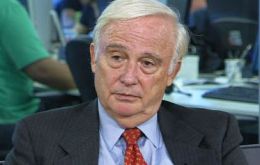
By Andrés Cisneros (*) - With the reinstatement of the 'impasse' on the issue of the Malvinas Islands, the Argentine government has made a wise decision. Not only because it puts in course again something proven useful in the past, but also because, looking into the future, there is no better path to the solution of the problem. It's not the mere restoration of a policy (good or bad) which already happened.
-
Tuesday, January 26th 2016 - 08:47 UTC
Malvinas: when Argentina is strong and united, world public opinion will back us
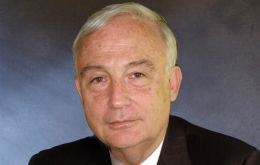
The meeting of the Argentine president with the British prime minister in Davos was “a good thing” a symptom that we are back on the right political track, which has been applied before: to continue claiming sovereignty over the Malvinas Islands, without having to spoil good relations, investments, trade, and with time and circumstances even consider joint undertakings.
-
Saturday, December 6th 2014 - 04:15 UTC
Chile consulted Argentina before allowing HMS Dragon to dock in Valparaiso
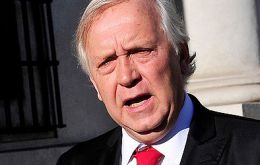
Chilean foreign minister Jorge Burgos revealed this week that the presence of HMS Dragon in Valparaiso was authorized after having consulted with Argentina, and underlined that Chile strictly abides with what was agreed regarding the passage of British vessels through Chilean waters.
-
Thursday, July 3rd 2014 - 07:02 UTC
Cobos Falklands' trip receives praise: challenge for all Argentina presidential hopefuls
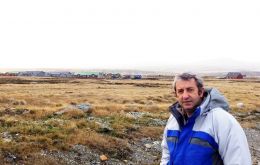
Despite Argentina's news agenda is absorbed by the World Cup, another possible default and the indictment for corruption of Vice-president Amado Boudou, the Argentine media still has time to talk about former vice-president and presidential hopeful Julio Cleto Cobos' current trip to the Falkland Islands.
-
Saturday, February 26th 2011 - 10:37 UTC
Falklands Facts

In his reply of 19 February to my letter of the 12th, Mr. Cisneros says “the worst thing we can do is quibble and distract ourselves from the main problem”. But it is not a “quibble” to state simple facts, as I did in my letter. So I suggest we get a few facts straight – not unilateral facts, but straightforward historical facts.
-
Saturday, February 19th 2011 - 16:36 UTC
Falklands/Malvinas controversy: “Minds closed, indeed”

The following article from Mr. Andres Cisneros is a reply to “Unilateral Facts II” (MP Feb. 12th) by Dr. Graham Pascoe and Peter Pepper. The first piece of this enriching exchange (Unilateral Facts) from Dr. Pascoe and Mr. Pepper was published in the BA Herald January 21st and a first reply from Mr. Cisneros (Unilateral Facts, indeed), Feb 6th in MP.
-
Saturday, February 12th 2011 - 12:44 UTC
Unilateral Fact II

Mr. Andres Cisneros’s reply to the article “Unilateral Facts” by Dr. Graham Pascoe and myself last Sunday in the BA Herald, (Jan 21st and Feb 6th in MP), does not answer our points adequately. Our article was specifically about Argentina’s hypocrisy in using UN Resolution 31/49 to criticise Britain’s acts as “unilateral”. Instead he launches a general anti-British diatribe, and makes a number of errors. The worst are as follows.
-
Sunday, February 6th 2011 - 19:30 UTC
Unilateral facts, indeed
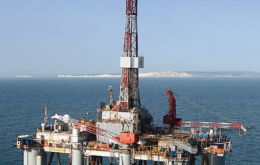
By Andrés Cisneros for the Herald
Peter Pepper and Graham Pascoe, who have spent years writing profusely on the issue, have just written a new article seeking to enlighten us on Malvinas rights.
